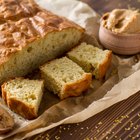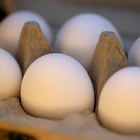More Articles
- What Can I Use as an Egg Substitute When Baking Cornbread?
- How Much Applesauce Do You Substitute for 1 Egg When Baking?
- What Can You Use in Place of Egg Yolk as a Binder in Cooking & Baking?
- Does Adding an Extra Egg to Brownie Mix Change the Texture?
- How to Replace Eggs With Applesauce, Banana and Bread

Some ingredients are relatively easy to substitute in baking, while others are relatively difficult. One of the hardest to replace is eggs, because they do so many things in a recipe. Still, if you have a vegan in the house or have a kid with egg allergies -- or if you've just plain run out of eggs -- there are ways to cope. It is easiest when you're baking things like cornbread, which have a relatively coarse texture.
Eggs in Baking
You probably don't think of it that way, but your cupboard full of baking ingredients is really a chemistry set. Most ingredients play a complicated role in the chemistry of your baked goods -- and eggs are a leading example. The proteins in the egg whites help give your baked goods structure, cooperating with the gluten in your flour to trap air and help the batter rise. The fat in egg yolks helps soften the crumb and enrich the flavor, and they contain emulsifiers that help the other ingredients mix better. Substituting for such a versatile ingredient is a tall order.
Flax
If you keep flax seed in your home for baking, you already have one of the most functional egg substitutes. To replace the eggs in your recipe, spoon flax seeds into your spice grinder and pulverize them. For every egg your corn bread recipe calls for, mix two tablespoons of the fresh-ground flax with three tablespoons of water and let the mixture sit for a few minutes while you measure the other ingredients. The flax will gel slightly, and simulate the texture of the egg in your cornbread. Flax doesn't help your cornbread rise, so add an extra 1/8 of a teaspoon of baking powder to compensate.
Fruit Purees
They're not always suitable because of the flavors they add, but you can also use fruit purees as an egg substitute. Use three tablespoons of mashed banana or avocado, or the same amount of applesauce or pumpkin puree, in place of each egg. These add richness and flavor to your cornbread, but you and your kids have to be comfortable with their flavors. Usually, you'll need an extra quarter-teaspoon of baking powder to compensate for their lack of leavening power.
Commercial Egg Substitutes
If you're working on a permanent substitution, keeping commercial egg replacers on hand is probably your best bet. Some brands use liquid or powdered egg whites, so read the label carefully if you're accommodating a vegan or an egg allergy. Others use a variety of gelling ingredients, such as xanthan gum or guar gum, to give the finished product a suitable texture. You might find the crumb of your baked goods is tougher when you use egg substitutes, but adding a little extra fat will compensate for that.
Non-Vegetarian Substitutes
If you just need a one-time replacement and it doesn't have to be vegetarian-friendly, you probably have a couple of other replacements in your cupboard and fridge. Gelatin makes a serviceable emergency replacement, providing a similar quantity of protein. For each egg soften a tablespoon of unflavored gelatin in one of cold water, then add two tablespoons of cold water and whisk it vigorously until it froths and add it to your cornbread. Alternatively, add three tablespoons of mayonnaise to your cornbread for each egg the recipe requires.
Related Articles

What Can I Use as an Egg Substitute ...

How Much Applesauce Do You Substitute ...

What Can You Use in Place of Egg Yolk ...

Does Adding an Extra Egg to Brownie Mix ...

How to Replace Eggs With Applesauce, ...
Role of Xanthan Gum in Vegan Baking

What Can Be Used Instead of Eggs for ...

How to Make Corn Bread That Won't ...

Can You Substitute Eggs With Cream ...

Can I Make Boxed Devil's Food Cake Mix ...

Can You Substitute Egg Beaters for Eggs ...

Is There a Substitute for Eggs in ...

How Many Calories Are in Jiffy ...

What Does Eggs vs. Oil Do for Bread ...

Whole Eggs Vs. Egg Yolks for Sweet Bread

How to Substitute Knox Gelatin for Eggs

Main Ingredients of English Muffins
How to Substitute Chia for Xanthan Gum

What Happens if You Use Brownie Mix ...

I Forgot to Put the Egg in the Banana ...
References
- On Food and Cooking: The Science and Lore of the Kitchen; Harold McGee
- The Cook's Thesaurus: Eggs
- Joy of Baking: Baking Ingredient Substitution Table
Writer Bio
Fred Decker is a trained chef and certified food-safety trainer. Decker wrote for the Saint John, New Brunswick Telegraph-Journal, and has been published in Canada's Hospitality and Foodservice magazine. He's held positions selling computers, insurance and mutual funds, and was educated at Memorial University of Newfoundland and the Northern Alberta Institute of Technology.
Photo Credits
Jupiterimages/Comstock/Getty Images